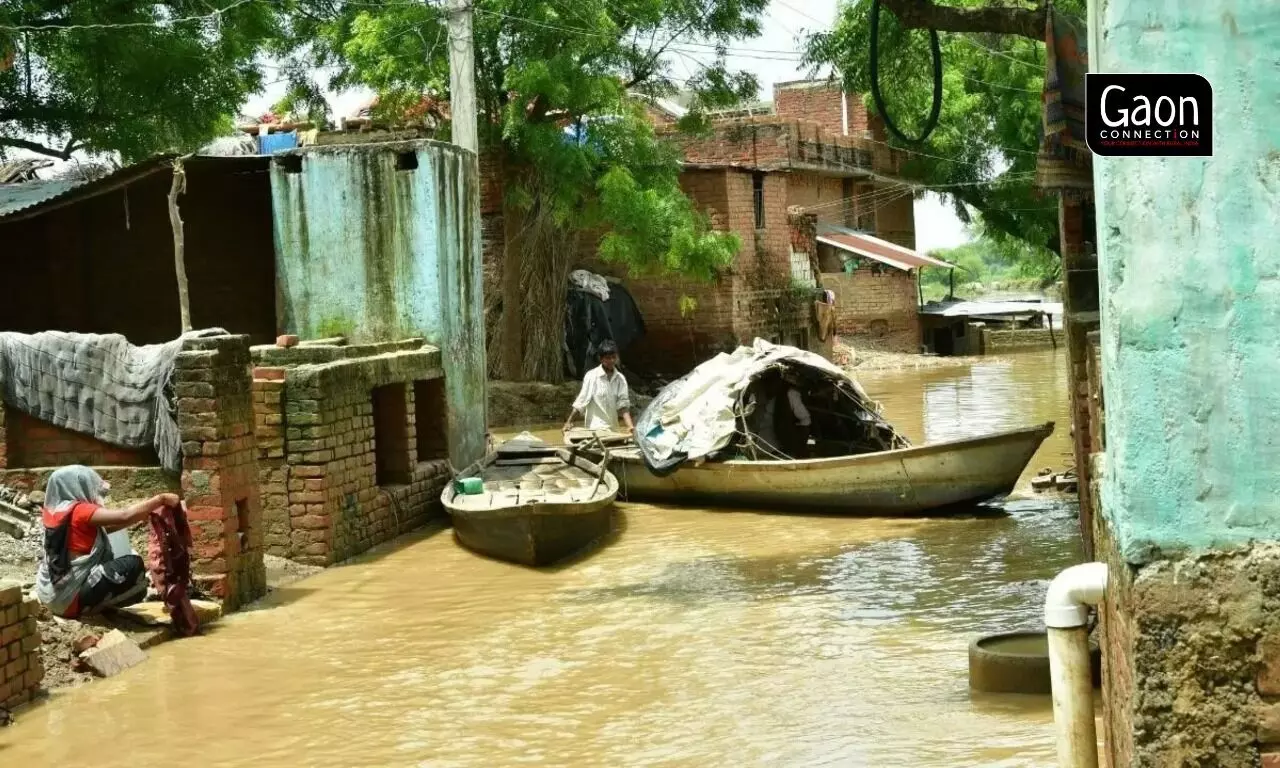Climate change expected to annually cause 250,000 deaths between 2030-2050; WHO lists five priority actions
Intense rainfall, frequent floods, forest fires and droughts triggered by climate change are claiming millions of lives every year. The South-East Asia Region, which is home to more than two billion people, is highly vulnerable to climate change. Read more on the five priority areas for action listed by the global public health body.
 गाँव कनेक्शन 7 April 2022 9:22 AM GMT
गाँव कनेक्शन 7 April 2022 9:22 AM GMT

Climate change is emerging as the biggest threat for humanity. Photo: Abhishek Verma
Nearly 13 million lives are lost every year worldwide due to environmental causes that are avoidable. Climate change is expected to cause an additional 250,000 deaths every year between 2030 and 2050 globally, warns the World Health Organization. South-East Asia already has the highest number of deaths related to climate change.
Rising temperatures also drive the spread of infectious diseases along with causing trauma, heat strokes and in case of extreme heat, organ failure and death. In a nutshell, climate change is emerging as the biggest threat for humanity.
Today, on the World Health Day 2022, the World Health Organization (WHO) has called for prioritising equitable health and accelerating steps to protect ecological systems and health to build wellbeing societies. The global public health body has urged the governments across countries and people to take measures to protect 'Our planet, our health'.
"Climate change is putting the health, well-being, and sustainable development of billions of people across the Region and the world at risk. It imperils decades of progress in reducing disease-related morbidity and mortality. We must act now to keep humans and our planet healthy," Poonam Khetrapal Singh, Regional Director, WHO South-East Asia Region, was quoted in a press statement dated April 6.
South-East Asia Region highly vulnerable
The WHO South-East Asia Region is home to more than two billion people who are highly vulnerable to climate change and has the highest estimated number of deaths due to climate change. The Region comprises 11 member states including Bangladesh, Bhutan, Democratic People's Republic of Korea, India, Indonesia, Maldives, Myanmar, Nepal, Sri Lanka, Thailand, Timor-Leste.
Intense rainfall, frequent floods, forest fires and droughts triggered by climate change are already impacting health and livelihood and causing huge sufferings, mental health issues, deaths and displacement, globally and in the Region.
Rising temperatures are also leading to outbreak of infectious disease, heat strokes, trauma and even death from extreme heat. Crop failure linked to climate change is driving malnutrition and undernutrition, noted the public health body.
Air pollution, a growing public health concern
The same pollutants poisoning our air are also impacting our health. Over 90 per cent of people globally breathe polluted air resulting in seven million deaths every year including 2.4 million deaths in the South East Asia Region. The ongoing COVID19 pandemic has further exposed the inequitable and unsustainable nature of existing political, social, and commercial decisions.
"We have a once-in-a-century opportunity to drive transformative, lasting change. The COVID-19 pandemic has shown us that if decision-making is transparent, evidence based, and inclusive, people will support bold and far-reaching policies that protect their health, families and livelihoods," said Singh.
"We are at a pivotal moment. The decisions and actions we take now can either escalate damage to the ecological systems that sustain human health and livelihoods, or they can promote a healthier, fairer, and greener world. Together we must confront the climate crisis, protect health for all and ensure a fairer, healthier, and greener future for generations to come," she added.
Five priority areas for action
The WHO has called on countries to prioritise equitable health now and for future generations including long-term investments, well-being budgets, social protection, and legal and fiscal strategies while protecting the planet.
- Protect and preserve the source of human health — nature. Improve air quality, support afforestation and sustainable farming, and strengthen food systems.
- Invest in essential services from water and sanitation to clean energy in health care facilities. In line with the 2017 Malé declaration, build climate-resilient health facilities which promote environmentally sustainable practices.
- Ensure quick and healthy energy transformation. While countries in the Region have made commendable progress towards renewable energy, increased action is needed, accompanied by rigorous enforcement of air quality standards.
- Promote healthy and sustainable food systems. Disease caused by lack of access to food or consumption of unhealthy ultra-processed food and beverages is a major contributor of noncommunicable diseases (NCDs)
- Build healthy and livable sustainable cities with green and healthy spaces to encourage physical activity, reduce greenhouse gas emissions and road traffic injuries.
#ClimateChange #World Health Organization #story
More Stories




